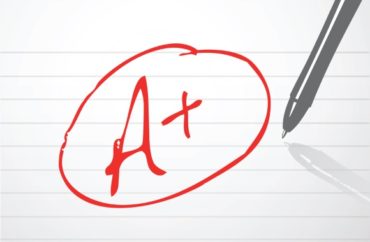
UPDATED
Grading scales in use for years obscure a child’s true performance
MADISON, Wisc. — As a kid, I always kicked into full subterfuge mode on the days I received my report card. In order to keep my report card hidden, I suddenly engaged in secret operations that would be the envy of any World War II-era spy. Hiding secret documents from the Nazis would have been child’s play compared to hiding my grades from my parents (who often only found out report cards had been issued weeks after the fact, after talking to other parents from the school.)
In the old days, it was easy for my parents to see that I was slacking off in school. They would simply look at the report card and see five or six subjects with a letter between “A” and “F” next to them. (Legend has it that a century ago, “E” was dropped as a grade, allegedly because some schools thought it would be confused for “Excellent.”)
Yet after a hundred-plus years of the standard “A-F” grading system, many modern schools have deemed it to be antiquated. Some districts have moved to their own proprietary grade scales in order to alleviate the shame a student may feel when earning a “D” or an “F.”
This week, I received my second-grade daughter’s report card from the Madison Metropolitan School District, on which she was given a grade of “EX,” “M,” “DV,” or “E.”
According to the key provided, these abbreviations stand for:
“Exceeding” – Student consistently exceeds grade-level expectations for the end of the year.
“Meeting” – Student consistently meets grade-level expectations for the end of the year.
“Developing” – Student is developing understanding and is approaching grade-level expectations for the end of the year.
“Emerging” – Student begins to show initial understanding of grade-level expectations for the end of the year.
This grading scale, used district-wide, has been in place for a decade. But as you can see, every grade is dripping with optimism, presuming every child is on the road to excellence – the only thing they are being graded on is the speed at which they are attaining complete world knowledge.
As a kid, I would no doubt love this scale – explaining to my parents that I wasn’t lazy, I was simply “Emerging,” would certainly have saved my rear end a few unwelcome meetings with a kitchen spoon.
(Also, isn’t every human being constantly “developing?” If nobody ever developed emotionally past second grade, the only job available to them would be U.S. president.)
But as a parent, I have no clue how my child is doing in school. None of these “grades” correspond to the “A to F” scale – further, they are all relative to what is expected by the end of the year, not specifically how well a child did during the time period tested.
In fact (warning: proud parent alert), my older daughter frequently received mixed grades on this scale during elementary school, and now she earns straight “A’s” on the standard scale being used in high school. (Lest anyone think the high school deserves credit for sticking with tradition, it is proposing a new “grade floor” to give students an automatic 40 percent credit for not turning in assignments, and allowing them up to 90 percent credit for turning in assignments late.)
The two scales don’t match up largely because the new grades assigned don’t address a specific class or subject – they deal mostly with behavior. The “Exceeding-Emerging” scale applies to 40 different classifications. Instead of being graded on “math” or “science,” my daughter is being graded on “Tells a story or describes an experience,” “cooperates with partners and in groups,” and “understands and identifies stages in the life cycle of insects.”
Of course, none of this gives any indication as to how she’s really doing in school.
A friend of mine noted that her school had recently moved to a number system, where a “4” was the best and “1” was the worst. “But a 3 meant that your kid is doing fine whether the kid had As or Cs,” she told me. “You didn’t learn the truth until middle school.”
Sure, if your child is receiving a lot of grades of “Emerging,” it might be time for you to worry – but the sugar-coated classifications only feed the idea that every child is equally brilliant, and they simply develop at different speeds.
This sort of rhetorical gamesmanship recently reared its head in California, where state lawmakers have discontinued use of the term “at risk” to describe students under adverse circumstances (criminal records, substance abuse, etc.) Instead, the state’s penal code now refers to “at promise” students, at least until that term falls out of favor and the state has to invent a new term for kids in tough circumstances.
In the old days, seeing a low grade on a report card was sounding an alarm that the kid wasn’t taking his or her studies seriously. Today, a low grade is just a suggestion that a child might have to wait slightly longer to unleash their immense cognitive abilities on the world.
The only question that remains is what options are left for parents who send their kids to school districts that deserve an “F” for honesty.
This story has been updated to clarify the grading scale has been in place for several years.
MORE: Erasing history: HS senior starts petition to eliminate ‘James Madison’ from school name
IMAGE: Shutterstock.com
Like The College Fix on Facebook / Follow us on Twitter






Please join the conversation about our stories on Facebook, Twitter, Instagram, Reddit, MeWe, Rumble, Gab, Minds and Gettr.